
Do you know which two animals ancient Hungarians most revered? The deer and the wolf! The former for its grace and gentle nature, and the latter for its strength and tendency toward predation.
While we no longer regard animals with quite the same level of esteem, they still play a large role in our daily lives. As a Hungarian learner, you’ll greatly benefit from learning the names of common animals in Hungarian. Doing so will allow you to better understand native Hungarian speakers and strike up conversations with just about anyone—because who doesn’t like talking about their pets or their favorite wild creatures?
In this article, you’ll learn the names of the most common Hungarian animals as well as those abroad. We’ll cover everything from pets to a variety of wildlife: mammals, reptiles, sea creatures, birds, and the list goes on. And the cherry on top? Toward the end of the article, we’ve also included the names of animal body parts and a handful of fun Hungarian idioms that mention animals.
For maximum clarity, we’ve listed each animal with its name in both English and Hungarian. But if you still have any questions or concerns, you can reach out to us in the comments—we’d be glad to help!
Ready to jump in?
![A Group of Animals [Two Dogs, Parrot, Cat, Snake, Mouse] in Front of a White Background](https://wordlist.languagepod101.com/wordlist/media/27147&v=medium.jpg)
 Table of Contents
Table of Contents
- At Home (Hungarian Pets / Magyar kiskedvencek)
- On the Farm (Hungarian Farm Animals / Magyar háziállatok)
- In the Wild / Forest / Safari (Hungarian Land Animals / Magyar szárazföldi állatok)
- In the Ocean (Hungarian Aquatic Animals / Magyar vízi állatok)
- Hungarian Bugs and Insects / Magyar bogarak és rovarok
- Hungarian Birds and Reptiles / Magyar madarak és hüllők
- Animal Body Parts
- Animal-Related Idioms and Slang Expressions in Hungarian
- How HungarianPod101.com Can Help You Get the Most out of Language Learning
1. At Home (Hungarian Pets / Magyar kiskedvencek)
This first category is probably everyone’s favorite, because who doesn’t like pets? Plus, the first Hungarian animal words you should learn are those you’re most likely to hear during a conversation. Pets are like this. Learning these words will allow you to talk about your own pets with a native Hungarian speaker, or even inquire about their favorite animals. Also, talking about your fur babies is a great ice-breaker when meeting new people.
- “Dog” – Kutya
- “Cat” – Macska
- “Hamster” – Hörcsög
- “Guinea pig” – Tengerimalac
- “Parrot” – Papagáj
- “Goldfish” – Aranyhal
- “Rabbit” – Nyúl
We call baby rabbits “bunnies” in English, right? Well, there are special names for baby animals in Hungarian, too. You can learn what some of them are and hear their correct pronunciation in our lesson Baby Animals.
- “Pond slider” – Ékszerteknős
- “Chinchilla” – Csincsilla
- “Mouse” – Egér
While mice are not usually considered pets, nothing is impossible! Nowadays, some people do own mice as pets—not to mention other strange animals, like snakes and tarantulas!
- → Would you like to hear the pronunciation of the most popular pets in Hungarian? Then visit our absolute beginner lesson Pets!
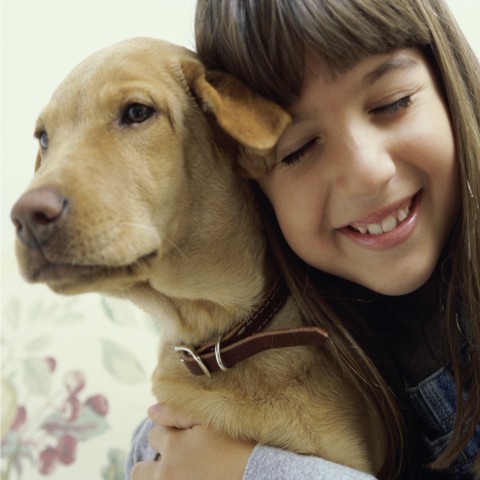
2. On the Farm (Hungarian Farm Animals / Magyar háziállatok)
The next category we’ll cover is farm animals (háziállatok). Before we look at this list of animals in Hungarian, let’s break down the word for farm animals:
Háziállatok is the plural form of háziállat, which refers to a single domestic animal. The word háziállat is composed of two separate words, which are házi (“related to the house”) and állat (“animal”).
- “Horse” – Ló
- “Cow” – Tehén
- “Calf” – Borjú
- “Duck” – Kacsa
- “Donkey” – Szamár
- “Goose” – Lúd
- “Sheep” – Birka
- “Cattle” – Szarvasmarha
- “Chicken” – Csirke
- “Turkey” – Pulyka
- “Rooster” – Kakas
- “Frog” – Béka
- “Pig” – Sertés / Disznó / Malac
- “Goat” – Kecske
- “Yak” – Jak
- “Fox” – Róka
While the fox is obviously not a domesticated animal, you can often find them lurking around roosts on farms in search of a nice meal.
- → Please visit our lesson Hungarian Vocab Builder: Animals to hear the pronunciation of more common domesticated animals.
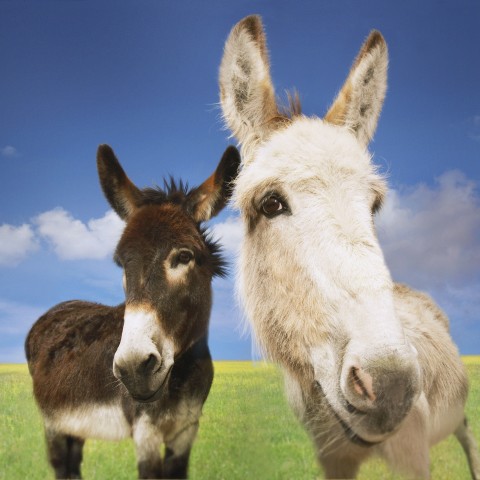
3. In the Wild / Forest / Safari (Hungarian Land Animals / Magyar szárazföldi állatok)
Now we’re getting to the interesting part. Wild animals are definitely some of the most fascinating creatures on the planet. And even though the “classic” wild or safari animals—which make up the majority of the following list—cannot be found in Hungary outside a zoo, Hungarian forests have their own captivating fauna. Wild animals in Hungary include bears, deer, and even wolves—but you definitely wouldn’t spot a lion outside a cage!
In Hungarian, we call wild animals vadállatok. Make sure to watch the plural suffix (-k) and the linking vowel (o). The names of some wild animals in Hungarian, as you can see below, are similar to their English counterparts.
- “Deer” – Szarvas
- “Bear” – Medve
- “Wolf” – Farkas
- “Lion” – Oroszlán
- “Elephant” – Elefánt
- “Cheetah” – Párduc
- “Rhinoceros” – Rinocérosz
- “Ostrich” – Strucc
Did you know that the strucc is the largest bird in the world? Learn more fun facts about animals on our website.
- “Zebra” – Zebra
- “Giraffe” – Zsiráf
- “Hippopotamus” – Víziló
- “Tiger” – Tigris
- “Gazelle” – Gazella
- “Chimpanzee” – Csimpánz
- “Meerkat” – Szurikáta
- “Jaguar” – Jaguár
- “Otter” – Vidra
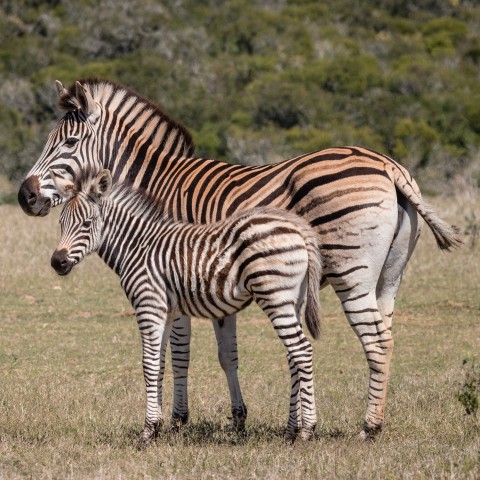
4. In the Ocean (Hungarian Aquatic Animals / Magyar vízi állatok)
The closest thing to an ocean you’ll find in Hungary is a big lake called Balaton, so you won’t be finding any octopus or jellyfish in Hungarian waters! Nonetheless, aquatic animals make for an interesting conversation topic, so it’s definitely worth learning their names in Hungarian.
- “Dolphin” – Delfin
- “Fish” – Hal
- “Shark” – Cápa
- “Whale” – Bálna
- “Octopus” – Polip
- “Jellyfish” – Medúza
- “Lobster” – Homár
- “Squid” – Tintahal
- “Turtle” – Teknősbéka
- “Eel” – Angolna
- “Salmon” – Lazac
- “Crab” – Rák
- “Clownfish” – Bohóchal
Did someone say “Nemo”? In Hungarian, we translate the name of this fish quite literally: bohóc (“clown”) and hal (“fish”).
- “Walrus” – Rozmár
- “Seahorse” – Tengericsikó
This one is funny, as it also translates quite literally. Csikó means “foal” in English, while tengeri means
“marine.”
- “Starfish” – Csillaghal

5. Hungarian Bugs and Insects / Magyar bogarak és rovarok
Even though many people find bugs and insects unpleasant, they’re actually an important part of the ecosystem. It may be hard to believe, but there are many bug species in Hungary that are currently endangered. Considering their importance, it would be good for you to learn at least a few bugs by their Hungarian names!
- “Spider” – Pók
- “Butterfly” – Pillangó
- “Bee” – Méh
- “Ant” – Hangya
- “Fly” – Légy
- “Caterpillar” – Hernyó
- “Stag beetle” – Szarvasbogár
- “Dragonfly” – Szitakötő
- “Ladybug” – Katicabogár
- “Cricket” – Tücsök
- “Wasp” – Darázs
- “Praying mantis” – Imádkozósáska
- “Flea” – Bolha
- “Earwig” – Fülbemászó
- “Grasshopper” – Szöcske
- “Stink bug” – Poloska
Hungary has been battling with stink bugs for many years, as they tend to form giant swarms during the fall. And the most annoying thing—as you might have guessed from their name—is that if you kill one, it’ll be super stinky afterward.
6. Hungarian Birds and Reptiles / Magyar madarak és hüllők
We couldn’t leave birds and reptiles out of our list of basic animals in Hungarian, right? They’re a crucial part of the planet’s fauna, and there are some really interesting species in Hungary. So, make sure to keep an eye out for them during your stay in Hungary—you’ll be able to encounter most of them in cities, as well as in forests and in the country.
- “Snake” – Kígyó
- “Aesculapian snake” – Sikló
Aesculapian snakes are very common in hilly settings.
- “Crocodile” – Krokodil
There are two zoos in Hungary that have crocodiles: one in Budapest and one in Debrecen.
- “Lizard” – Gyík
- “Pond turtle” – Mocsári teknős
The pond turtle is one of the endangered animals in Hungary, so you’d better watch out for them. If you harm one, you could be fined 50,000 HUF (which is approximately 135 EUR or 168 USD).
- “Adder” – Vipera
- “Eagle” – Sas
- “Swan” – Hattyú
- “White stork” – Fehér gólya
- “Blackbird” – Fekete rigó
- “Crow” – Varjú
- “Swallow” – Fecske
- “Tit” – Cinege
- “Pigeon” – Galamb
Pigeons are common in cities, especially in the most famous squares. This is because some people like to feed them, which draws them in like a moth to a flame.
And last but not least, let’s cross the border between natural and supernatural for a moment:
- “Turul” – Turul
Even though this is a mythical bird of prey, we wanted to include it on our list of Hungarian animal words, as the turul is the national animal of Hungary.
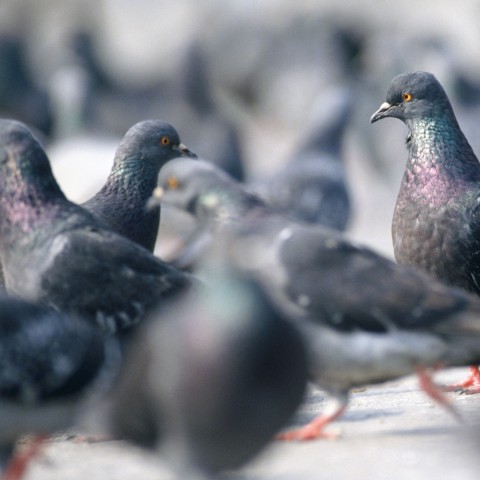
7. Animal Body Parts
A word list of the most common animal words in the Hungarian language would not be complete without the names of animal body parts. Here are the most important ones:
- “Tail” – Farok
- “Paw” – Mancs
- “Hoof” – Pata
- “Tentacle” – Csáp
- “Beak” – Csőr
- “Snout” – Ormány
- “Udder” – Tőgy
- “Crest” – Sörény
- “Claw” – Karom
- “Whisker” – Macskabajusz
Literally, the Hungarian word for “whisker” means “cat mustache.” Clever, eh?
8. Animal-Related Idioms and Slang Expressions in Hungarian
Finally, let’s see some Hungarian idioms and slang expressions that mention some of the animals from our list. Some of these are pretty funny, so you might want your notebook handy to take some notes. 😉
#1 “To kill two flies with one hit” – Két legyet üt egy csapásra
Original idiom: “To kill two birds with one stone”
#2 “Don’t look a gift horse in the mouth.” – Ajándék lónak ne nézd a fogát!
#3 “The smart one lets go; the donkey suffers.” – Okos enged, szamár szenved.
This idiom means that if you’re wise, you won’t get into a fight with someone (even if they’re wrong!). Otherwise, you’ll needlessly tire yourself out and lose the fight.
#4 “Owl tells to the sparrow that it has a big head.” – Bagoly mondja verébnek, hogy nagyfejű.
Original idiom: “The pot calls the kettle black.”
#5 “Lots of geese defeat the pig.” – Sok lúd disznót győz.
This idiom means that the weak can defeat the strong if there’s enough of them.
Which of these animal-related idioms is your favorite?
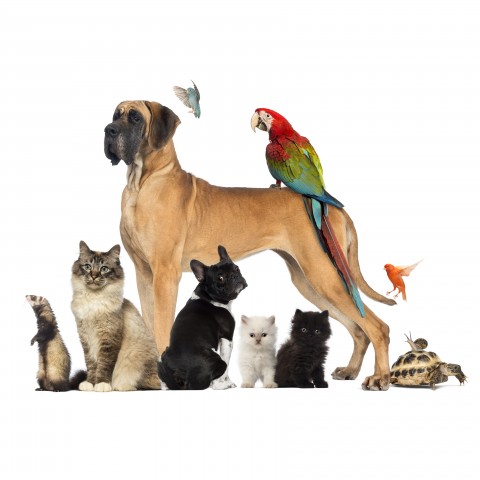
9. How HungarianPod101.com Can Help You Get the Most out of Language Learning
How many Hungarian animal names do you still remember? Hopefully, you’ve gotten at least one or two safely tucked away already, but don’t forget to read through this article again and write down any words you’re struggling to remember. This will help store all of this new vocabulary in your long-term memory!
Today, we introduced you to the Hungarian names of several different animals:
- Pets
- Farm animals
- Wild animals
- Aquatic creatures
- Bugs and insects
- Birds and reptiles
We also provided a short list of animal body parts in Hungarian and introduced a few fun animal-related idioms.
Did you enjoy studying about the animals native to Hungary and learning what to call the animals in your country?
Before you go, let us know in the comments what your favorite animal is! Do you know its name in Hungarian?










